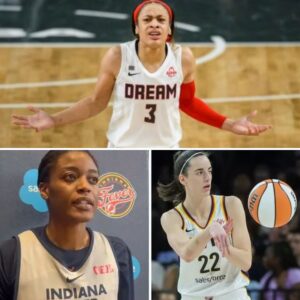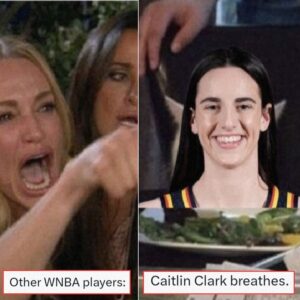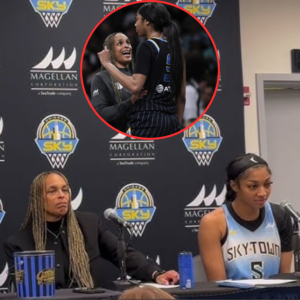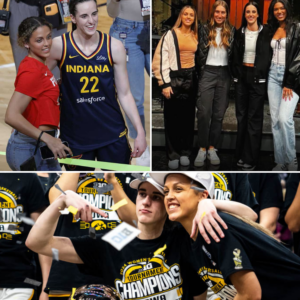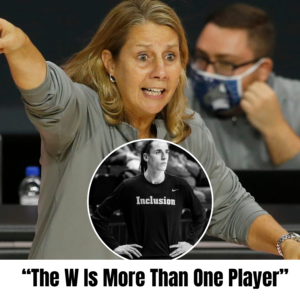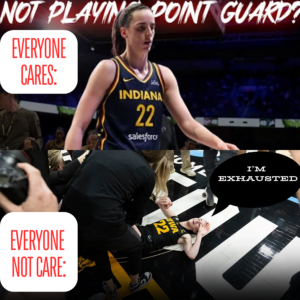“Challenges in Bridging the Financial Gap: The Caitlin Clark Effect on the WNBA’s Economic Landscape”
Entering the WNBA as a rising star, Caitlin Clark’s impact reverberates throughout the league, marking a significant shift in the women’s basketball landscape. Following her standout performance in the NCAA women’s Final Four, Clark’s selection as the first overall pick in the WNBA draft garnered immense attention, contributing to record-breaking TV viewership comparable to major league drafts. The Indiana Fever, her new team, experiences unprecedented demand for tickets, while her jerseys sell out rapidly, signaling a surge in fan interest. Despite these positive indicators, the WNBA grapples with enduring financial challenges, underscoring the stark disparity in compensation between male and female athletes.
Hall of Famer Nancy Lieberman emphasizes the urgency for improvement, acknowledging the current inadequacy of the WNBA’s financial framework. Negotiating new agreements among players, the league, broadcasters, and other stakeholders will be pivotal in reshaping financial dynamics. However, WNBA players remain bound by the terms of the collective bargaining agreement signed in 2020, constraining their earning potential.
While the WNBA’s revenue has seen growth in recent years, it still falls significantly short of the NBA’s substantial earnings. Reports suggest a revenue projection of $180 million to $200 million for the WNBA’s upcoming season, highlighting the vast contrast with the NBA’s multibillion-dollar revenue stream. This stark difference underscores the challenges in achieving equitable compensation for WNBA players, with rookies like Clark earning a base salary of just $76,000, further highlighting the need for systemic reform within the league.
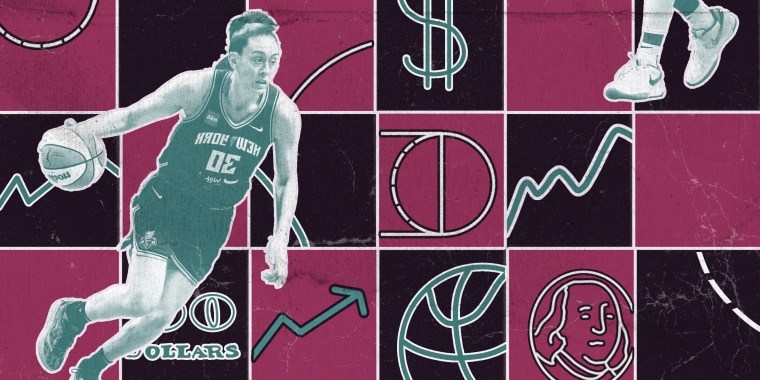
While Caitlin Clark stands to earn additional income from lucrative sponsorship deals and performance-based bonuses, as well as marketing arrangements with her team and the league, her potential earnings still pale in comparison to the NBA’s league minimum salary, which currently hovers around $1 million. Despite these supplementary sources of income, the gender pay gap in basketball extends beyond mere monetary figures.
Unlike their NBA counterparts, WNBA players do not benefit from a equitable revenue-sharing model. While NBA players typically receive a 50-50 split of basketball-related revenues with team owners, WNBA players are subject to revenue-sharing arrangements only under specific conditions, which, thus far, have not been met. This disparity underscores the broader systemic challenges facing female athletes in achieving financial parity within their respective leagues.
Following the conclusion of this season, WNBA players will have the option to opt out of their current collective bargaining agreement (CBA) — a decision that seems increasingly likely given the remarkable growth trajectory of the women’s game, even before Caitlin Clark captured the nation’s attention.
With emerging stars like Clark entering the league, there is optimism that better terms and increased financial opportunities await WNBA players.
One significant aspect of this potential transformation lies in renegotiating broadcasting rights, which could significantly enhance the league’s value and potentially render revenue-sharing thresholds obsolete.
Ironically, the fate of the WNBA rests largely in the hands of the NBA, which maintains control over more than 40% of the women’s league.
Terri Carmichael Jackson, the Executive Director of the Women’s National Basketball Players Association, has urged the NBA to prioritize the WNBA’s prominence, emphasizing the vital role of its players in shaping the league’s future success.
“It’s time the NBA recognizes the indispensable role of WNBA players in shaping the league’s future success,” Carmichael Jackson stated in a released statement.
She continued, emphasizing the need for the NBA to acknowledge the value of WNBA players and advocate for million-dollar salaries, which necessitate a robust broadcast deal. This, she argued, requires players to be active participants in negotiations, underscoring their value to the league’s business operations.
When approached for comment, an NBA spokesperson directed inquiries to the WNBA.
In response, WNBA Commissioner Cathy Engelbert reiterated the league’s commitment to its players, highlighting efforts to enhance player benefits beyond the requirements of the existing CBA.
“We continue to find ways to return some of the growth we have been experiencing to the players beyond what the CBA requires,” Engelbert stated. She outlined specific initiatives, such as increasing playoff bonuses and implementing a $4 million budgeted charter flight program for playoff games and the Commissioner Cup Championship Game.
WNBA players aren’t necessarily advocating for salary parity with their NBA counterparts. Instead, as highlighted by Las Vegas Aces standout Kelsey Plum on a recent episode of the Vegas-centric “The Residency Podcast,” their primary goal is equitable compensation based on a shared percentage of revenue.
Nancy Lieberman, a revered figure in basketball as a Hall of Famer, emphasized a perceived reluctance to make the necessary investments to elevate the game’s prominence, whether on television or in other arenas.
“Being a trailblazer can often feel isolating,” she remarked, noting that her own achievements often resulted from the support of decision-makers, predominantly men, who took a leap of faith.
Lieberman’s sentiments echo those expressed by University of Connecticut women’s basketball coach Geno Auriemma, who offered a more pointed critique of the WNBA’s promotional efforts.
“The WNBA is going to have to do a great job of marketing these guys,” he asserted at a recent news conference, referring to emerging stars like Caitlin Clark and Paige Bueckers. “And the WNBA I don’t think has done a great job of marketing their individual stars.”
News
“No bloody joke”: Temi Fagbenle gained social media admiration for defending Caitlin Clark and criticizing Chennedy Carter’s actions, exciting fans.
“No bloody joke”: Caitlin Clark’s teammate, Temi Fagbenle, has earned widespread admiration on social media for speaking out against Chennedy Carter’s undisciplined actions towards Clark. Fagbenle’s candid and strong defense of her teammate has struck a chord with fans and…
‘Wameh doing and Wameh things’: Despite advocating for “Women Empowerment,” they criticize Caitlin, claiming she doesn’t do anything that the other girls can’t do, so they have a right to be upset.
In the fast-paced world of basketball, where athleticism and skill are celebrated, there exists a paradoxical situation within the realm of “Women Empowerment.” Despite the rhetoric surrounding support for women in sports, there are instances where female athletes face criticism…
Teresa Weatherspoon Praises Angel Reese for Courageously Overcoming ‘Harsh Media Criticism’ That Made Many Angry and ‘Spout Profanity’
The dark side of popularity really exists. Not many would know this better than Chicago’s rookie Angel Reese. From her very entry into the LSU Tigers to her everyday moves, she has known what it feels like to be under…
Gabbie Marshall and Caitlin Clark: 5 Instances Where the Former Iowa Duo Showcased Their Heartwarming Friendship in the 2024 WNBA Season
Caitlin Clark and Gabbie Marshall’s best moments. The former Iowa star hooper Caitlin Clark has made her way to the WNBA as the No. 1 pick in the 2024 draft class. Accompanied by her other talented teammates like Gabbie Marshall…
Lynx Head Coach Cheryl Reeve is fed up with the hype surrounding Caitlin Clark, and might not want her on Olypic squad. How stupid! Dismissing Clark’s impact seems shortsighted, as she’s drawing unprecedented attention to the league.
Indiana Fever star and 2024 WNBA No. 1 overall pick Caitlin Clark‘s popularity continues to grow and it’s to a point that even the current legendary WNBA coaches are a bit annoyed with the media and corporate infatuation with the NCAA’s…
WNBA officiating needs to dial back the physicality that often overshadows the players’ talent. Did you read the Fever’s coach’s comments about Caitlin Clark being absolutely exhausted and she thought she was going to have to go on the court and help her to the bench she was so tired??
The issue of physicality in WNBA officiating has come under scrutiny recently, with concerns that it often overshadows the players’ talent. The comments made by the Fever’s coach regarding Caitlin Clark’s exhaustion highlight the demanding nature of the WNBA and…
End of content
No more pages to load
